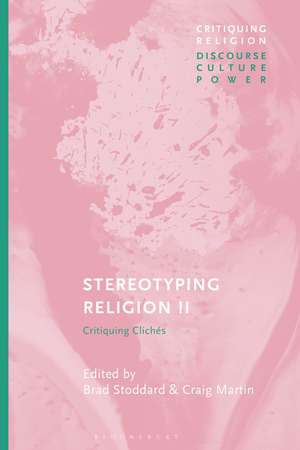Stereotyping Religion II: Critiquing Clichés: Critiquing Religion: Discourse, Culture, Power
Editat de Brad Stoddard, Craig Martinen Limba Engleză Paperback – 17 mai 2023
| Toate formatele și edițiile | Preț | Express |
|---|---|---|
| Paperback (1) | 149.02 lei 3-5 săpt. | +30.18 lei 4-10 zile |
| Bloomsbury Publishing – 17 mai 2023 | 149.02 lei 3-5 săpt. | +30.18 lei 4-10 zile |
| Hardback (1) | 405.64 lei 6-8 săpt. | |
| Bloomsbury Publishing – 17 mai 2023 | 405.64 lei 6-8 săpt. |
Preț: 149.02 lei
Preț vechi: 160.51 lei
-7% Nou
Puncte Express: 224
Preț estimativ în valută:
28.51€ • 29.77$ • 23.55£
28.51€ • 29.77$ • 23.55£
Carte disponibilă
Livrare economică 25 martie-08 aprilie
Livrare express 08-14 martie pentru 40.17 lei
Preluare comenzi: 021 569.72.76
Specificații
ISBN-13: 9781350263598
ISBN-10: 1350263591
Pagini: 176
Dimensiuni: 156 x 234 x 25 mm
Greutate: 0.45 kg
Editura: Bloomsbury Publishing
Colecția Bloomsbury Academic
Seria Critiquing Religion: Discourse, Culture, Power
Locul publicării:London, United Kingdom
ISBN-10: 1350263591
Pagini: 176
Dimensiuni: 156 x 234 x 25 mm
Greutate: 0.45 kg
Editura: Bloomsbury Publishing
Colecția Bloomsbury Academic
Seria Critiquing Religion: Discourse, Culture, Power
Locul publicării:London, United Kingdom
Caracteristici
Each chapter is structured in the same way, covering the origins of the cliché, examples from popular culture and scholarly literature, and how the cliché is used for rhetorical and/or political reasons.
Notă biografică
Craig Martin is Professor of Religious Studies, St. Thomas Aquinas College, USA. He is co-editor of Stereotyping Religion: Critiquing Clichés (Bloomsbury, 2018), and author of Capitalizing Religion (Bloomsbury, 2014) and Discourse and Ideology (Bloomsbury, 2022). Brad Stoddard is Associate Professor of Religious Studies, McDaniel College, USA. He is co-editor of Stereotyping Religion: Critiquing Clichés (Bloomsbury, 2018) and Race, Ethnicity, and New Religious Movements (Bloomsbury, 2019).
Cuprins
Contributor Bios AcknowledgmentsIntroduction1. "Religion is personal and not subject to government regulation," Savannah Finver (Ohio State University, USA)2. "Religious freedom is about religious freedom," Rita Lester (Nebraska Wesleyan University, USA) and Jacob Barrett (University of Alabama, USA)3. "All religions are against LGBTQ rights," James Crossley (St. Mary's University, UK)4. "Spirituality is about spirituality," Brad Stoddard (McDaniel College, USA) and Craig Martin (St. Thomas Aquinas College, USA)5. "Eastern religions are more spiritual than Western religions," Ting Guo (The Chinese University of Hong Kong, Hong Kong)6. "Each religion has an authentic, unchanging core," David G. Robertson (The Open University, UK)7. "Religion and science naturally conflict," Donovan Schaefer (University of Pennsylvania, USA)8. "Conservative religions oppress women (while liberal religions don't)," Leslie Dorrough Smith (Avila University, USA)9. "Religious pluralism gives everyone a voice," Martha Smith Roberts (Denison University, USA)10. "Cults are not real religions," Matthew Baldwin (Mars Hill University, USA)NotesBibliographyIndex
Recenzii
Stereotyping Religion II shows, in clear straightforward examples, how the way we think about things limits what we can see. The authors of these chapters demonstrate how stereotypes erase some possibilities and make other seem inevitable, rooted in the very nature of reality. Even more, they show how stereotypes held across the political spectrum are incompatible, opening up new ways of thinking through some of our most vexing issues.
Another set of popular conceptions are challenged in this fine volume, demonstrating forcefully the need to continue shaking common assumptions about religion.
Another set of popular conceptions are challenged in this fine volume, demonstrating forcefully the need to continue shaking common assumptions about religion.









